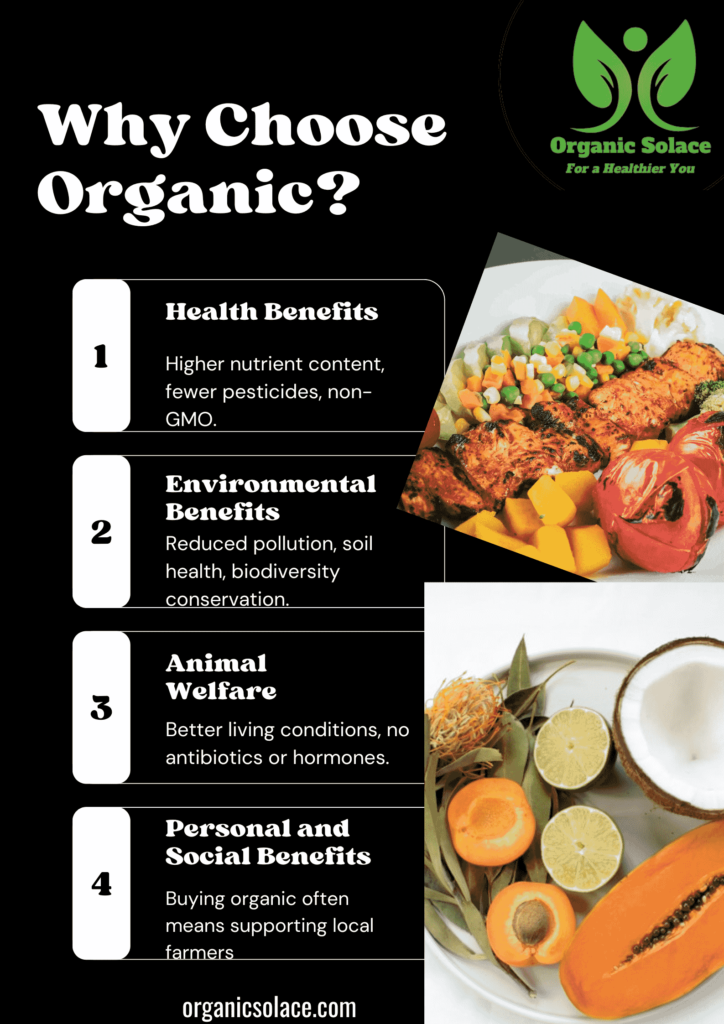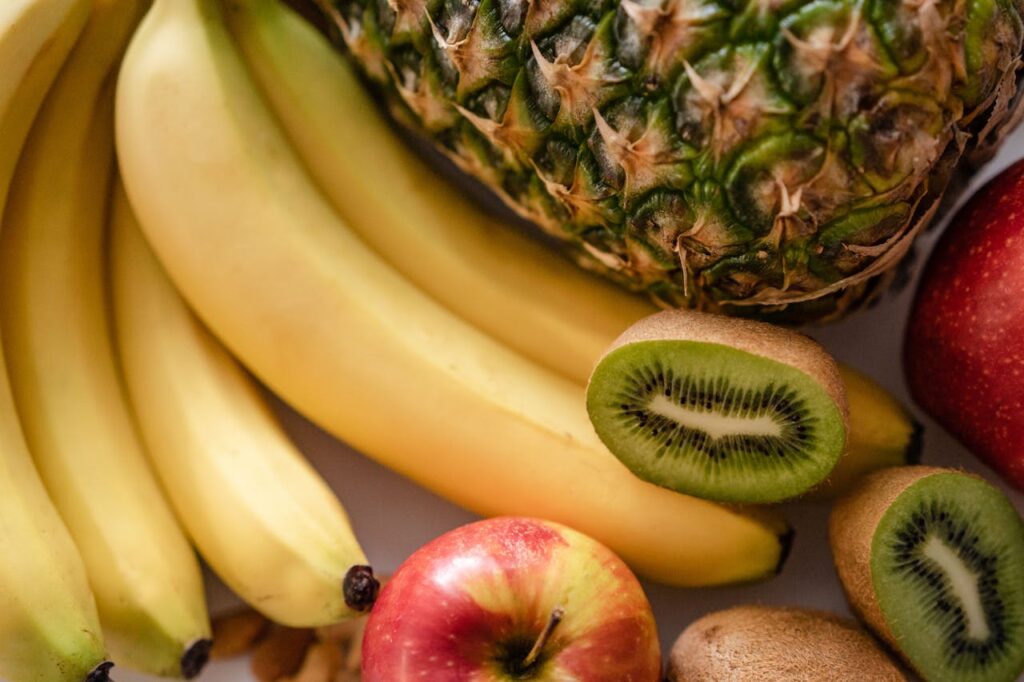Organic foods have become increasingly popular in recent years due to their many benefits. These foods are grown and processed without synthetic chemicals, such as pesticides and fertilizers, and do not contain genetically modified organisms (GMOs).
The benefits of choosing organic foods extend beyond just personal health; they also positively impact the environment and society. Here, we explore the main benefits of organic foods and why making the switch can be a beneficial choice.
What is organic food?
Organic food simply refers to food or products that are grown, produced, processed, and handled using methods that promote ecological balance and conserve biodiversity.
For instance, organic farming methods aim to produce food without the use of synthetic pesticides, fertilizers, genetically modified organisms (GMOs), antibiotics, or growth hormones.

Fig. 1: Why choose organic?
1. Health Benefits of Organic Foods
Higher nutritional value
Many studies have found that organic foods may have a higher nutritional value compared to their conventional counterparts. Organic produce usually contains higher levels of vitamins, minerals, and antioxidants. For instance, organic fruits and vegetables have been found to contain higher levels of vitamin C, iron, magnesium, and phosphorus.
Reduced exposure to pesticides
Lower exposure to hazardous chemicals and pesticides is one of the biggest advantages of eating organic food. Synthetic pesticides are frequently used to treat crops cultivated conventionally, which can be harmful to human health. You can reduce your exposure to these dangerous compounds and promote a healthy lifestyle by choosing organic foods and products.
Organic farming methods prohibit the application of synthetic chemicals; instead, natural techniques such as crop rotation, composting, as well as biological pest management are used. This decreased chemical load often results in decreased pesticide residues in organic food and eventually mitigates health risks linked to pesticide exposure.
No Genetically Modified Organisms (GMOs)
Organic foods are GMO-free, implying they are not genetically modified in any way. GMOs have been a topic of controversy because of potential health risks and environmental concerns. By choosing organic, consumers avoid the uncertainties associated with genetically modified foods.
Lower levels of hormones and antibiotics
Organic meat and dairy products come from animals that are not treated with antibiotics or growth hormones. Overuse of antibiotics in conventional farming can lead to antibiotic-resistant bacteria, posing a significant public health risk. Consuming organic animal products reduces this risk and ensures that the food is free from artificial hormones.
2. Environmental Benefits of Organic Foods
Sustainable Farming Practices
Organic farming practices are designed to be sustainable and environmentally friendly. Organic farmers employ methods such as crop rotation, green manure, composting, and biological pest control to maintain soil health and fertility. These practices help to preserve the ecosystem and reduce the carbon footprint of farming.
Reduced pollution
Conventional farming depends heavily on synthetic pesticides and fertilizers, which can contaminate soil and water sources. Organic farming reduces the use of these chemicals, leading to less pollution and a healthier environment. This helps to protect wildlife and biodiversity, as well as the quality of air and water.
Soil health
Organic farming practices mainly focus on building healthy soil via natural methods. Healthy soil is vital for growing nutrient-rich crops and maintaining a balanced ecosystem. Practices such as composting and crop rotation improve soil structure, increase organic matter, and improve water retention.
Conservation of water
Organic farming methods prioritize water conservation and efficient water use. Methods such as mulching, cover cropping, and reduced tillage help retain soil moisture and reduce water runoff. This is especially important in regions facing water scarcity and drought conditions.
3. Animal Welfare
Organic farming standards comprise strict guidelines for animal welfare. Animals raised on organic farms are typically provided with more space, better access to the outdoors, and a more natural diet compared to those raised in conventional systems. This makes sure that animals are treated humanely and live in healthier, less stressful conditions.
Free-Range and Pasture-Raised
Organic livestock are usually free-range or pasture-raised, implying they have access to outdoor areas where they can roam and graze. This contrasts with the confined spaces and overcrowded conditions common in conventional farming. Free-range and pasture-raised animals tend to be healthier and less prone to diseases.
4. Better quality and taste
Several individuals believe that organic foods taste better than conventionally grown foods. This could be due to the absence of synthetic chemicals and the fact that organic farming focuses on soil health and plant nutrition. Organic fruits and vegetables usually have a richer, more authentic flavor, and organic meats and dairy products can be more flavorful and tender.

Fig. 2: Foods that you can buy organic
5. Social and economic benefits
Supporting local farmers
Purchasing organic foods usually means supporting local farmers and small-scale producers. A number of organic farms are family-owned and operated, contributing to the local economy and promoting sustainable agriculture. This helps to create jobs and keep rural communities vibrant.
Fair Trade Practices
Organic farming usually aligns with fair trade practices, making sure that farmers and workers are paid fair wages and work in safe conditions. This is particularly important in developing countries, where conventional farming practices can exploit labor and degrade working conditions.
Promoting Food Safety
Organic certification involves stringent standards and regular inspections, which help ensure that organic foods are safe and of high quality. Consumers can trust that organic products are free from harmful additives, synthetic chemicals, and GMOs.
Conclusion
The benefits of organic foods are manifold, impacting personal health, environmental sustainability, animal welfare, and social equity. By choosing organic, you can enjoy nutrient-rich, flavorful foods while supporting farming practices that protect the planet and promote humane treatment of animals.
As awareness of these benefits continues to grow, more people are making the switch to organic, contributing to a healthier and more sustainable future for all.
Although organic food may cost more than conventional food, several consumers see it as an investment in their own health. With the growing demand for organic food, it’s critical to balance the advantages above any potential disadvantages and make well-informed decisions that are consistent with personal objectives and values.
Frequently Asked Questions
What is the impact of eating solely organic?
Eating solely organic food has different impacts on health, the environment, and even economic considerations. Starting with health impacts, it reduces one’s exposure to pesticides. Since organic food is produced without the use of artificial fertilizers and pesticides, exposure to potentially hazardous substances is likely reduced.
Research indicates that when comparing organic to conventionally grown vegetables, there may be less pesticide residue on organic produce. Second, nutritional content; Although the findings are still mixed, some research indicate that eating organic food may result in higher concentrations of specific nutrients, such as antioxidants.
For instance, organic meat and dairy products may contain more omega-3 fatty acids. Third, avoidance of hormones and antibiotics; Some people opt for organic meat and dairy products since they are produced from animals that have not been exposed to growth hormones or antibiotics.
Regarding environmental impact, organic agricultural practices usually prioritize sustainability by employing composting, crop rotation, as well as other environmentally friendly practices. This can result in increased biodiversity, less pollution, and better soil health. Looking at economic impacts of eating solely organic, because organic farming requires labor-intensive procedures and yields are lower than those of conventional farming, organic foods usually become more expensive. For others, this can make eating only organic food prohibitively expensive.
How do we know if food is actually organic?
There are several essential indicators that you may use to be sure food is truly organic, such as certifications, labels, as well as practices that are governed by different organizations. In the U.S. for instance, the certification that is most widely recognized is the USDA (United States Department of Agriculture) Organic seal.
Foods that are labeled as “100% Organic” should have only organic components (except from salt and water), whereas those labeled as “Organic” must have at least 95 percent organic ingredients. Foods with 70-94 percent organic ingredients always use the label “Made with Organic Ingredients” and cannot use the USDA organic label. One should also understand various organic standards since they can vary by region or country.
What chemicals do we avoid when eating organic?
Eating organic food helps you avoid a number of synthetic chemicals that are often used in conventional farming and food production. For instance, some of the synthetic herbicides and pesticides include glyphosate, organophosphates, neonicotinoids, and atrazine. Synthetic fertilizers contain chemicals such as ammonium sulfate and ammonium nitrate.
Besides, GMOs are not allowed under organic standards, so you can avoid eating foods that have been genetically modified to withstand pesticides, increase particular qualities, or resist pests. Other chemicals that people can avoid when they eat organic include antibiotics and growth hormones; synthetic preservatives, flavorings and additives; processing aids and chemical solvents; and irradiation and sewage sludge.
How does it affect your inside and outside?
Eating solely organic food has advantages for both one’s internal and physical health. Internally, you are less exposed to toxic chemicals, better hormonal balance, and improved gut health. Physically, the benefits usually manifest as healthier skin, hair, as well as improves general well-being.
Nevertheless, it is important to eat varied and balanced organic diet to completely realize these benefits.


